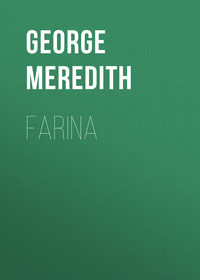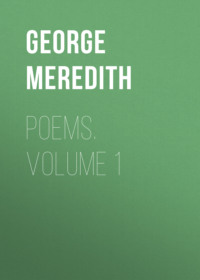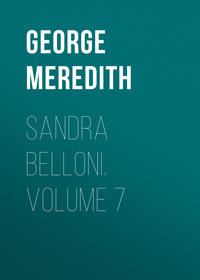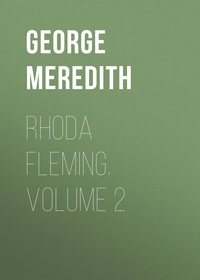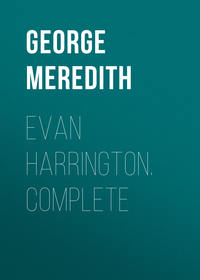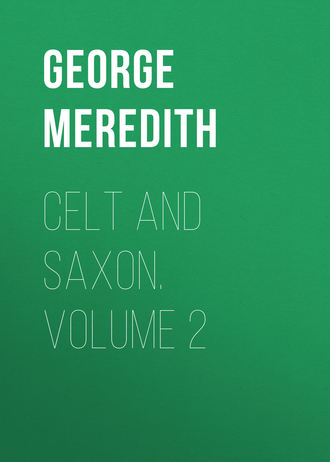
Celt and Saxon. Volume 2
'A walk over! a pure ceremonial,' said the priest, and he yawned frightfully.
'You're for a nap to recompose you, my dear friend,' remarked the captain.
'But you haven't confided anything of it to Mrs. Adister?'
'Not a syllable; no. That's to come. There's my contest! I had urgent business in Ireland, and she 's a good woman, always willing to let me go. I count on her kindness, there 's no mightier compliment to one's wife. She'll know it when it's history. She's fond of history. Ay, she hates fiction, and so I'm proud to tell her I offer her none. She likes a trifling surprise too, and there she has it. Oh! we can whip up the business to a nice little bowl of froth-flummery. But it's when the Parliamentary voting is on comes the connubial pull. She's a good woman, a dear good soul, but she's a savage patriot; and Philip might have saved his kinsman if he had liked. He had only to say the word: I could have done all the business for him, and no contest to follow by my fireside. He's on his couch—Mars convalescent: a more dreadful attraction to the ladies than in his crimson plumes! If the fellow doesn't let slip his opportunity! with his points of honour and being an Irish Bayard. Why Bayard in the nineteenth century's a Bedlamite, Irish or no. So I tell him. There he is; you'll see him, Kathleen: and one of them as big an heiress as any in England. Philip's no fool, you'll find.'
'Then he's coming all right, is he?' said Kathleen.
'He 's a soldier, and a good one, but he 's nothing more, and as for patriotic inflammation, doesn't know the sensation.'
'Oh! but he's coming round, and you'll go and stroke down mother with that,' Kathleen cried. 'Her heart's been heavy, with Patrick wandering and Philip on his back. I'll soon be dressed for breakfast.'
Away she went.
'She's got an appetite, and looks like a strapped bit of steel after the night's tumbling,' said the captain, seeing her trip aloft. 'I'm young as that too, or not far off it. Stay, I'll order breakfast for four in a quiet corner where we can converse—which, by the way, won't be possible in the presence of that gaping oyster of a fellow, who looks as if he were waiting the return of the tide.'
Father Boyle interposed his hand.
'Not for . . .' he tried to add 'four.' The attempt at a formation of the word produced a cavernous yawn a volume of the distressful deep to the beholder.
'Of course,' Captain Con assented. He proposed bed and a sedative therein, declaring that his experience overnight could pronounce it good, and that it should be hot. So he led his tired old friend to the bedroom, asked dozens of questions, flurried a withdrawal of them, suggested the answers, talked of his Rubicon, praised his wife, delivered a moan on her behalf, and after assisting to half disrobe the scarce animate figure, which lent itself like an artist's lay-model to the operation, departed on his mission of the sedative.
At the breakfast for three he was able to tell Kathleen that the worthy
Father was warm, and on his way to complete restoration.
'Full fathom five the Father lies, in the ocean of sleep, by this time,' said Con. 'And 'tis a curious fact that every man in that condition seems enviable to men on their legs. And similarly with death; we'd rather not, because of a qualm, but the picture of the finish of the leap across is a taking one. These chops are done as if Nature had mellowed their juiciness.'
'They are so nice,' Kathleen said.
'You deserve them, if ever girl in this world!'
'I sat on deck all night, and Mr. Colesworth would keep me company.'
'He could hardly do less, having the chance. But that notwithstanding,
I'm under an obligation to your cavalier. And how did you find Ireland,
sir? You've made acquaintance with my cousin, young Mr. Patrick
O'Donnell, I rejoice to hear.'
'Yes, through his hearing or seeing my name and suspecting I had a sister,' said Mr. Colesworth, who was no longer in the resemblance of a gaping oyster on the borders of the ebb. 'The country is not disturbed.'
'So the doctor thinks his patient is doing favourably! And you cottoned to Patrick? And I don't wonder. Where was it?'
'We met in Trieste. He was about to start by one of the Austrian boats for the East.'
'Not disturbed! no! with a rotten potato inside it paralysing digestion!' exclaimed Con. 'Now Patrick had been having a peep at Vienna, hadn't he?'
'He had; he was fresh from Vienna when I met him. As to Ireland, the harvest was only middling good last year.'
'And that's the bit of luck we depend on. A cloud too much, and it's drowned! Had he seen, do you know, anybody in Vienna?—you were not long together at Trieste?'
Mr. Colesworth had sufficient quickness to perceive that the two questions could be answered as one, and saying: 'He was disappointed,' revealed that he and Patrick had been long enough together to come to terms of intimacy.
'To be sure, he gave you a letter of introduction to his family!' said Con. 'And permit me to add, that Patrick's choice of a friend is mine on trust. The lady he was for seeing, Mr. Colesworth, was just then embarking on an adventure of a romantic character, particularly well suited to her nature, and the end of it was a trifle sanguinary, and she suffered a disappointment also, though not perhaps on that account.'
'I heard of it in England last year,' said Mr. Colesworth. 'Did she come through it safely?'
'Without any personal disfigurement: and is in England now, under her father's roof, meditating fresh adventures.'
Kathleen cried: 'Ye 're talking of the lady who was Miss Adister—I can guess—Ah!' She humped her shoulders and sent a shudder up her neck.
'But she's a grand creature, Mr. Colesworth, and you ought to know her,' said Con. 'That is, if you'd like to have an idea of a young Catherine or a Semiramisminus an army and a country. There's nothing she's not capable of aiming at. And there's pretty well nothing and nobody she wouldn't make use of. She has great notions of the power of the British Press and the British purse—each in turn as a key to the other. Now for an egg, Kathleen.'
'I think I'll eat an egg,' Kathleen replied.
'Bless the honey heart of the girl! Life's in you, my dear, and calls for fuel. I'm glad to see that Mr. Colesworth too can take a sight at the Sea-God after a night of him. It augurs magnificently for a future career. And let me tell you that the Pen demands it of us. The first of the requisites is a stout stomach—before a furnished head! I'd not pass a man to be anything of a writer who couldn't step ashore from a tempest and consume his Titan breakfast.'
'We are qualifying for the literary craft, Miss O'Donnell,' said Mr.
Colesworth.
'It's for a walk in the wind up Caer Gybi, and along the coast I mean to go,' said Kathleen.
'This morning?' the captain asked her.
She saw his dilemma in his doubtful look.
'When I've done. While you're discussing matters with Father Boyle. I—know you're burning to. Sure it's yourself knows as well as anybody, Captain Con, that I can walk a day long and take care of my steps. I've walked the better half of Donegal alone, and this morning I'll have a protector.'
Captain Con eyed the protector, approved of him, disapproved of himself, thought of Kathleen as a daughter of Erin—a privileged and inviolate order of woman in the minds of his countrymen—and wriggling internally over a remainder scruple said: 'Mr. Colesworth mayhap has to write a bit in the morning.'
'I'm unattached at present,' the latter said. 'I am neither a correspondent nor a reporter, and if I were, the event would be wanting.'
'That remark, sir, shows you to be eminently a stranger to the official duties,' observed the captain. 'Journalism is a maw, and the journalist has to cram it, and like anything else which perpetually distends for matter, it must be filled, for you can't leave it gaping, so when nature and circumstance won't combine to produce the stuff, we have recourse to the creative arts. 'Tis the necessity of the profession.'
'The profession will not impose that necessity upon me,' remarked the young practitioner.
'Outside the wheels of the machine, sir, we indulge our hallucination of immunity. I've been one in the whirr of them, relating what I hadn't quite heard, and capitulating what I didn't think at all, in spite of the cry of my conscience—a poor infant below the waters, casting up ejaculatory bubbles of protestation. And if it is my reproach that I left it to the perils of drowning, it's my pride that I continued to transmit air enough to carry on the struggle. Not every journalist can say as much. The Press is the voice of the mass, and our private opinion is detected as a discord by the mighty beast, and won't be endured by him.'
'It's better not to think of him quite as a beast,' said Mr. Colesworth.
'Infinitely better: and I like your "guile," sir: But wait and tell me what you think of him after tossing him his meat for a certain number of years. There's Rockney. Do you know Rockney? He's the biggest single gun they've got, and he's mad for this country, but ask him about the public, you'll hear the menagerie-keeper's opinion of the brute that mauled his loins.'
'Rockney,' said Mr. Colesworth, 'has the tone of a man disappointed of the dictatorship.'
'Then you do know Rockney!' shouted Captain Con. 'That's the man in a neat bit of drawing. He's a grand piece of ordnance. But wait for him too, and tell me by and by. If it isn't a woman, you'll find, that primes him, ay, and points him, and what's more, discharges him, I'm not Irish born. Poor fellow! I pity him. He had a sweet Irish lady for his wife, and lost her last year, and has been raging astray politically ever since. I suppose it's hardly the poor creature's fault. None the less, you know, we have to fight him. And now he 's nibbling at a bait—it 's fun: the lady I mentioned, with a turn for adventure and enterprise: it's rare fun: he 's nibbling, he'll be hooked. You must make her acquaintance, Mr. Colesworth, and hold your own against her, if you can. She's a niece of my wife's and I'll introduce you. I shall find her in London, or at our lodgings at a Surrey farm we've taken to nurse my cousin Captain Philip O'Donnell invalided from Indian awful climate!– on my return, when I hope to renew the acquaintance. She has beauty, she has brains. Resist her, and you 'll make a decent stand against Lucifer. And supposing she rolls you up and pitches you over, her noticing you is a pretty compliment to your pen. That 'll be consoling.'
Mr. Colesworth fancied, he said, that he was proof against feminine blandishments in the direction of his writings.
He spoke as one indicating a thread to suggest a cable. The captain applauded the fancy as a pleasing delusion of the young sprigs of Journalism.
Upon this, Mr. Colesworth, with all respect for French intelligence, denied the conclusiveness of French generalisations, which ascribed to women universal occult dominion, and traced all great affairs to small intrigues.
The captain's eyes twinkled on him, thinking how readily he would back smart Miss Kathleen to do the trick, if need were.
He said to her before she started: 'Don't forget he may be a clever fellow with that pen of his, and useful to our party.'
'I'll not forget,' said she.
For the good of his party, then, Captain Con permitted her to take the walk up Caer Gybi alone with Mr. Colesworth: a memorable walk in the recollections of the scribe, because of the wonderful likeness of the young lady to the breezy weather and the sparkles over the deep, the cloud that frowned, the cloud that glowed, the green of the earth greening out from under wings of shadow, the mountain ranges holding hands about an immensity of space. It was one of our giant days to his emotions, and particularly memorable to him through the circumstance that it insisted on a record in verse, and he was unused to the fetters of metre: and although the verse was never seen by man, his attempt at it confused his ideas of his expressive powers. Oddly too, while scourging the lines with criticism, he had a fondness for them: they stamped a radiant day in his mind, beyond the resources of rhetoric to have done it equally.
This was the day of Captain Con's crossing the Rubicon between the secret of his happiness and a Parliamentary career.
CHAPTER XVIII
CAPTAIN CON'S LETTER
Women may be able to tell you why the nursing of a military invalid awakens tenderer anxieties in their bosoms than those called forth by the drab civilian. If we are under sentence of death we are all of us pathetic of course; but stretched upon the debateable couch of sickness we are not so touching as the coloured coat: it has the distinction belonging to colour. It smites a deeper nerve, or more than one; and this, too, where there is no imaginary subjection to the charms of military glory, in minds to which the game of war is lurid as the plumes of the arch-slayer.
Jane Mattock assisting Mrs. Adister O'Donnell to restore Captain Philip was very singularly affected, like a person shut off on a sudden from her former theories and feelings. Theoretically she despised the soldier's work as much as she shrank abhorrently from bloodshed. She regarded him and his trappings as an ensign of our old barbarism, and could peruse platitudes upon that theme with enthusiasm. The soldier personally, she was accustomed to consider an inferior intelligence: a sort of schoolboy when young, and schoolmaster when mature a visibly limited creature, not a member of our broader world. Without dismissing any of these views she found them put aside for the reception of others of an opposite character; and in her soul she would have ascribed it to her cares of nursing that she had become thoughtful, doubtful, hopeful, even prayerful, surcharged with zeal, to help to save a good sword for the country. If in a world still barbarous we must have soldiers, here was one whom it would be grievous to lose. He had fallen for the country; and there was a moving story of how he had fallen. She inclined to think more highly of him for having courted exposure on a miserable frontier war where but a poor sheaf of glory could be gathered. And he seemed to estimate his professional duties apart from an aim at the laurels. A conception of the possibility of a man's being both a soldier and morally a hero edged its way into her understanding. It stood edgeways within, desirous of avoiding a challenge to show every feature.
The cares of nursing were Jane's almost undividedly, except for the aid she had from her friend Grace Barrow and from Miss Colesworth. Mrs. Adister O'Donnell was a nurse in name only. 'She'll be seen by Philip like as if she were a nightmare apparition of his undertaker's wraith,' Captain Con said to Jane, when recommending his cousin to her charitable nature, after he had taken lodgings at a farmhouse near Mrs. Lackstraw's model farm Woodside on the hills. 'Barring the dress,' as he added, some such impression of her frigid mournfulness might have struck a recumbent invalid. Jane acknowledged it, and at first induced her aunt to join her in the daily walk of half a mile to sit with him. Mrs. Lackstraw was a very busy lady at her farm; she was often summoned to London by her intuition of John's wish to have her presiding at table for the entertainment of his numerous guests; she confessed that she supervised the art of nursing better than she practised it, and supervision can be done at a distance if the subordinate is properly attentive to the rules we lay down, as Jane appeared to be. So Jane was left to him. She loved the country; Springtide in the country set her singing; her walk to her patient at Lappett's farm and homeward was an aethereal rapture for a heart rocking easy in fulness. There was nothing to trouble it, no hint of wild winds and heavy seas, not even the familiar insinuation from the vigilant monitress, her aunt, to bid her be on her guard, beware of what it is that great heiresses are courted for, steel her heart against serpent speeches, see well to have the woman's precious word No at the sentinel's post, and alert there. Mrs. Lackstraw, the most vigilant and plain-spoken of her sex, had forborne to utter the usual warnings which were to preserve Miss Mattock for her future Earl or Duke and the reason why she forbore was a double one; a soldier and Papist could never be thought perilous to a young woman scorning the sons of Mars and slaves of sacerdotalism. The picture of Jane bestowing her hand on a Roman Catholic in military uniform, refused to be raised before the mind. Charitableness, humaneness, the fact that she was an admirable nurse and liked to exercise her natural gift, perfectly accounted for Jane's trips to Lappett's farm, and the jellies and fresh dairy dainties and neat little dishes she was constantly despatching to the place. A suggestion of possible danger might prove more dangerous than silence, by rendering it attractive. Besides, Jane talked of poor Captain Philip as Patrick O'Donnell's brother, whom she was bound to serve in return for Patrick's many services to her; and of how unlike Patrick he was. Mrs. Lackstraw had been apprehensive about her fancy for Patrick. Therefore if Captain Philip was unlike him, and strictly a Catholic, according to report, the suspicion of danger dispersed, and she was allowed to enjoy the pleasures of the metropolis as frequently as she chose. The nursing of a man of Letters, or of the neighbour to him, a beggar in rags, would not have been so tolerated. Thus we perceive that wits actively awake inside the ring-fence of prepossessions they have erected may lull themselves with their wakefulness. Who would have thought!—is the cry when the strongest bulwark of the fence is broken through.
Jane least of any would have thought what was coming to pass. The pale square-browed young officer, so little Irish and winning in his brevity of speech, did and said nothing to alarm her or strike the smallest light. Grace Barrow noticed certain little changes of mood in Jane she could scarcely have had a distinct suspicion at the time. After a recent observation of him, on an evening stroll from Lappett's to Woodside, she pronounced him interesting, but hard. 'He has an interesting head . . . I should not like to offend him.' They agreed as to his unlikeness to fluid Patrick; both eulogistic of the absent brother; and Jane, who could be playful in privacy with friends, clapped a brogue on her tongue to discourse of Patrick and apostrophise him: 'Oh! Pat, Pat, my dear cousin Pat! why are you so long away from your desponding Jane? I 'll take to poetry and write songs, if you don't come home soon. You've put seas between us, and are behaving to me as an enemy. I know you 'll bring home a foreign Princess to break the heart of your faithful. But I'll always praise you for a dear boy, Pat, and wish you happy, and beg the good gentleman your brother to give me a diploma as nurse to your first- born. There now!'
She finished smiling brightly, and Grace was a trifle astonished, for her friend's humour was not as a rule dramatic.
'You really have caught a twang of it from your friend Captain Con; only you don't rattle the eighteenth letter of the alphabet in the middle of words.'
'I've tried, and can't persuade my tongue to do it "first off," as boys say, and my invalid has no brogue whatever to keep me in practice,' Jane replied. 'One wonders what he thinks of as he lies there by the window. He doesn't confide it to his hospital nurse.'
'Yes, he would treat her courteously, just in that military style,' said
Grace, realising the hospital attendance.
'It 's the style I like best:—no perpetual personal thankings and allusions to the trouble he gives!' Jane exclaimed. 'He shows perfect good sense, and I like that in all things, as you know. A red-haired young woman chooses to wait on him and bring him flowers—he's brother to Patrick in his love of wild flowers, at all events!—and he takes it naturally and simply. These officers bear illness well. I suppose it 's the drill.'
'Still I think it a horrid profession, dear.'
Grace felt obliged to insist on that: and her 'I think,' though it was not stressed, tickled Jane's dormant ear to some drowsy wakefulness.
'I think too much honour is paid to it, certainly. But soldiers, of all men, one would expect to be overwhelmed by a feeling of weakness. He has never complained; not once. I doubt if he would have complained if Mrs. Adister had been waiting on him all the while, or not a soul. I can imagine him lying on the battle-field night after night quietly, resolving not to groan.'
'Too great a power of self-repression sometimes argues the want of any emotional nature,' said Grace.
Jane shook her head. She knew a story of him contradicting that.
The story had not recurred to her since she had undertaken her service. It coloured the remainder of an evening walk home through the beechwoods and over the common with Grace, and her walk across the same tracks early in the morning, after Grace had gone to London. Miss Colesworth was coming to her next week, with her brother if he had arrived in England. Jane remembered having once been curious about this adventurous man of Letters who lived by the work of his pen. She remembered comparing him to one who was compelled to swim perpetually without a ship to give him rest or land in view. He had made a little money by a book, and was expending it on travels—rather imprudently, she fancied Emma Colesworth to be thinking. He talked well, but for the present she was happier in her prospect of nearly a week of loneliness. The day was one of sunshine, windless, odorous: one of the rare placid days of April when the pettish month assumes a matronly air of summer and wears it till the end of the day. The beech twigs were strongly embrowned, the larches shot up green spires by the borders of woods and on mounds within, deep ditchbanks unrolled profuse tangles of new blades, and sharp eyes might light on a late white violet overlooked by the children; primroses ran along the banks. Jane had a maxim that flowers should be spared to live their life, especially flowers of the wilds; she had reared herself on our poets; hence Mrs. Lackstraw's dread of the arrival of one of the minstrel order: and the girl, who could deliberately cut a bouquet from the garden, if requested, would refuse to pluck a wildflower. But now they cried out to her to be plucked in hosts, they claimed the sacrifice, and it seemed to her no violation of her sentiment to gather handfuls making a bunch that would have done honour to the procession of the children's May-day—a day she excused for the slaughter because her idol and prophet among the poets, wild nature's interpreter, was that day on the side of the children. How like a bath of freshness would the thick faintly-fragrant mass shine to her patient! Only to look at it was medicine! She believed, in her lively healthfulness, that the look would give him a spring to health, and she hurried forward to have them in water-the next sacred obligation to the leaving of them untouched.
She had reared herself on our poets. If much brooding on them will sometimes create a sentimentalism of the sentiment they inspire, that also, after our manner of developing, leads to finer civilisation; and as her very delicate feelings were not always tyrants over her clear and accurate judgement, they rather tended to stamp her character than lead her into foolishness. Blunt of speech, quick in sensibility, imaginative, yet idealistic, she had the complex character of diverse brain and nerve, and was often a problem to the chief person interested in it. She thought so decisively, felt so shrinkingly; spoke so flatly, brooded so softly! Such natures, in the painful effort to reconcile apparent antagonism and read themselves, forget that they are not full grown. Longer than others are they young: but meanwhile they are of an age when we are driven abroad to seek and shape our destinies.
Passing through the garden-gate of Lappett's farm she made her way to the south-western face of the house to beg a bowl of water of the farmer's wife, and had the sweet surprise of seeing her patient lying under swallows' eaves on a chair her brother had been commissioned to send from London for coming uses. He was near the farm-wife's kitchen, but to windward of the cooking-reek, pleasantly warmed, sufficiently shaded, and alone, with open letter on the rug covering his legs. He whistled to Jane's dog Wayland, a retriever, having Newfoundland relationships, of smithy redness and ruggedness; it was the whistle that startled her to turn and see him as she was in the act of handing Mrs. Lappett her primroses.


